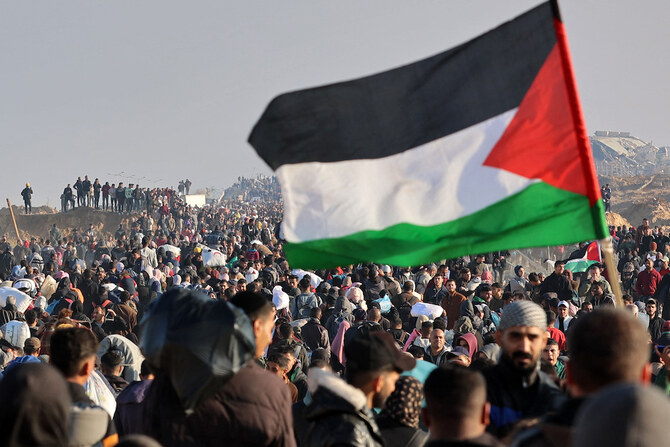RIYADH: Saudi Arabia on Sunday reiterated its categorical rejection of statements regarding the displacement of the Palestinian people from their land, particularly those made by Israeli Prime Minister Benjamin Netanyahu.
The Kingdom’s Foreign Ministry said in a statement that it rejected “such statements that aim to divert attention from the continuous crimes committed by the Israeli occupation against the Palestinian brothers in Gaza, including the ethnic cleansing they are subjected to.”
The ministry likewise expressed its appreciation of the “condemnation, disapproval and total rejection announced by the brotherly countries” regarding the Israeli leader’s comments.
“The Kingdom also points out that this extremist, occupying mentality does not understand what the Palestinian land means to the brotherly people of Palestine and their emotional, historical and legal connection to this land, and it does not think that the Palestinian people deserve to live in the first place, as it has completely destroyed the Gaza Strip, killed and injured more than 160,000, most of them children and women, without the slightest human feeling or moral responsibility,” the Saudi Foreign Ministry statement said.
“The Kingdom affirms that the Palestinian people have a right to their land, and they are not intruders or immigrants to it who can be expelled whenever the brutal Israeli occupation wishes.
#Statement | The Kingdom of Saudi Arabia appreciates the condemnation, disapproval and total rejection announced by the brotherly countries towards what Benjamin Netanyahu stated regarding the displacement of the Palestinian people from their land and the Kingdom values the… pic.twitter.com/ebj2sVHx4w
— Foreign Ministry (@KSAmofaEN) February 9, 2025
“The Kingdom notes that the proponents of these extremist ideas are the ones who prevented Israel from accepting peace by refusing peaceful coexistence, rejecting the peace initiatives adopted by the Arab countries, and systematically practicing injustice toward the Palestinian people for more than 75 years, with disregard to the truth, justice, law and the values established in the United Nations Charter, including the human’s right to live in dignity on his land,” the statement added.
The Saudi Foreign Ministry also reiterated that the right of the Palestinian people “will remain firmly established and no one will be able to take it away from them no matter how long it takes.”
It added lasting peace would only be achieved by “returning to the logic of reason and accepting the principle of peaceful coexistence through the two-state solution.”
Egypt earlier condemned as “irresponsible” statements by Israeli officials suggesting establishing a Palestinian state on Saudi territory, with its Foreign Ministry emphasizing that the suggestion was a “direct infringement of Saudi sovereignty.” It added that the Kingdom’s security was a “red line for Egypt.”
The Jordanian Foreign Ministry described the Israeli remarks as “inflammatory and a clear violation of international law, relevant UN resolutions and state sovereignty.”
Spokesperson Sufian Qudah criticized what he described as Israel’s continued provocative policies and rhetoric, stressing that such statements reflect an exclusionary and hostile approach that undermines regional stability, Petra reported.
Jordan, he added, stands in full solidarity with Saudi Arabia against these statements, urging international actors to take a firm stance against irresponsible rhetoric that threatens peace efforts.
The UAE also strongly condemned and denounced Netanyahu’s “reprehensible and provocative” statements regarding the establishment of a Palestinian state in Saudi Arabia and “affirmed its categorical rejection of these unacceptable statements.”
Jassim Al-Budaiwi, the secretary-general of the Gulf Cooperation Council, on Sunday condemned the Israeli statements, describing them as “dangerous and irresponsible.”
He noted that the GCC countries strongly supported Saudi Arabia’s advocacy for the legitimate rights of the Palestinian people and the establishment of a Palestinian state within the pre-1967 borders.
Al-Budaiwi urged the international community to take a “serious and decisive” stand against aggressive Israeli statements that threaten the security and stability of the region.
The Kuwaiti Ministry of Foreign Affairs also rejected Netanyahu’s statements and expressed its support for Saudi Arabia in defense of its stability and sovereignty.
Bahrain said that these Israeli comments were “irresponsible,” and the suggestion of establishing a Palestinian state on Saudi territory was “a flagrant violation of international law and the UN Charter.”
The Bahraini Ministry of Foreign Affairs added that Manama was fully supportive “of the brotherly Kingdom of Saudi Arabia and stands by its security, stability, and sovereignty.”
It added that preserving the rights of Palestinians and preventing their displacement from their lands, alongside establishing a Palestinian state, was the only path to a just and comprehensive peace in the Middle East.
Qatar also condemned Netanyahu’s comment suggesting establishing a Palestinian state inside Saudi territory, the Qatari foreign ministry said in statement.
Qatar, a key mediator in Gaza ceasefire negotiations between Hamas and Israel, described Netanyahu’s statement as “provocative.”
– with Reuters














